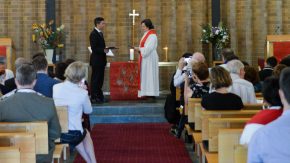Important Concussion Information 2018
Baseline Concussion Testing
Newington College has once again teamed with sports injury specialist Dr Ryan Kohler to implement the HeadSmart Sports Concussion Program for schools and clubs. This year, at Stanmore, every rugby, football and AFL player will be required to complete a preseason baseline computer concussion test. This is another tool, used with clinical questioning and a physical examination, to help in the management of a suspected concussion.
The online baseline test is a series of four card games structured to test memory accuracy, attention span, concentration and brain processing speed. It takes about eight minutes to complete. If a concussion is sustained, the player will repeat the same online test in the health centre, which is compared to the baseline.
All players enrolled in rugby, football and AFL Y7 – Y12 will receive a notification to do this computer baseline test. It should be completed at home in a quiet place without distraction for best results.
This season Newington plans to run concussion clinics for students with a sports doctor to provide effective concussion management.
Before returning to their contact sport, a player must:
- Be symptom-free for 19 days (rugby), 6 days (soccer), no set time (AFL);
- Have completed an after-concussion online test which is comparable to their baseline;
- Be managing school and homework normally;
- Have completed a Gradual Return to Play program to stage 4, and
- Hand in a medical clearance from a doctor to Sister Bates (Health Centre)
For more information
Concussion Management – Guidance and Procedure
Community Concussion Guidelines
Football Federation Australia Concussion Guidelines
Concussion
While concussion can occur in any sport, we see more incidents during the winter sports season. A concussion is an injury to the brain, causing a disturbance in the brain’s ability to acquire and process information.
It is usually caused by a blow to the head or indirectly by an impact to the body transferring a force to the brain. This causes the brain to rotate and/or move forward and backward within the rigid skull cavity.
A person does not need to lose consciousness to suffer a concussion.
Concussion symptoms may evolve over hours or days following the injury.
Symptoms
Physical symptoms can include headache, vision disturbance, dizziness, vomiting, confusion, seizure, unsteady ‘jelly’ legs, ringing in the ears and loss of balance or being slow to get up.
Cognitive behaviour changes affect memory, judgement, concentration, reflexes and muscle coordination. The concussed player can ask repetitive questions.
Emotional changes such as irritability, feeling nervous, crying, aggressiveness or laughing inappropriately.
Sensitivity to light/noise and sleep disturbance (sleeping more or difficulty going to sleep) can also be symptoms of concussion.
On the day the rule is: if a concussion is suspected, the player is removed from play and must not be allowed back on that day. If in doubt, sit it out and seek medical attention.
Rugby AU have been trialling a blue card system. Once a player is shown a blue card by the match official, they cannot participate any further in the match and are required to undergo a mandatory medical assessment and then follow a set program before returning to rugby.
Management
Children and adolescents need a conservative approach as studies have shown that their brains take longer to recover. Most concussions will settle in 10 – 14 days but some symptoms may persist for longer.
A doctor will diagnose a concussion from clinical history and physical examination. Sometimes a CT scan or MRI is ordered to rule out any bleeding in the brain or fracture, but these tests will not identify a concussion.
The player who has a concussion should inform the school nurse, his coach and mentor.
The treatment for concussion is rest – physical and mental. Computer games, reading and doing homework, for example, tire the brain so initially it is best to stop these activities. As the symptoms reduce these can be gradually reintroduced.
Missing school or shorter school days may be required to ensure mental rest. A ‘Return to Learn’ plan may be developed to help with return to school and homework.
Once clinical symptoms have resolved a graduated return to play is undertaken with a medical clearance from a doctor required before returning to sport. Please remember that a player cannot return to contact for 18 days after symptoms cease.
The Graduated Return To Play (GRTP) program.
Each stage of the GRTP takes at least 24 hours and the person must remain symptom-free after each stage. If symptoms develop then the player rests for 24 hours or until symptoms subside and starts that stage again.
| Stage 1 | REST – mental and physical – once managing school, commence balance and postural exercises. |
| Stage 2 |
15-20mins light aerobic exercise: walking / swimming / stationary cycling If no symptoms develop 24 hours later, he progresses to stage 3. |
| Stage 3 |
25 – 30mins sport-specific, non-contact drills with change of direction. If no symptoms develop 24 hours later, he progresses to stage 4. |
| Stage 4 |
25-30mins sport-specific with team, non-contact drills and light weights. Remains at this stage until 19 days from end of symptoms has occurred. |
| Concussion Clearance |
A ‘Concussion Clearance Certificate’ from a medical doctor must be given to the concussion coordinator (School Nurse M Bates) before starting contact training. |
| Stage 5 | Contact training session / practice
If symptom-free 24 hours after Step 5 then the player is able to participate in a game or event. |
Helmets in sport have been shown to reduce impacts and lacerations to the head but have not been shown to reduce the incidence of concussion. They are essential when bike riding, skiing etc to aid in the prevention of skull fractures.
The use of mouth guards has been shown to reduce dental injuries and maxillofacial injuries. Some studies have suggested that mouth guards reduced impact forces applied to the jaw from being transmitted to the brain.
Sister Margaret Bates
School Nurse








